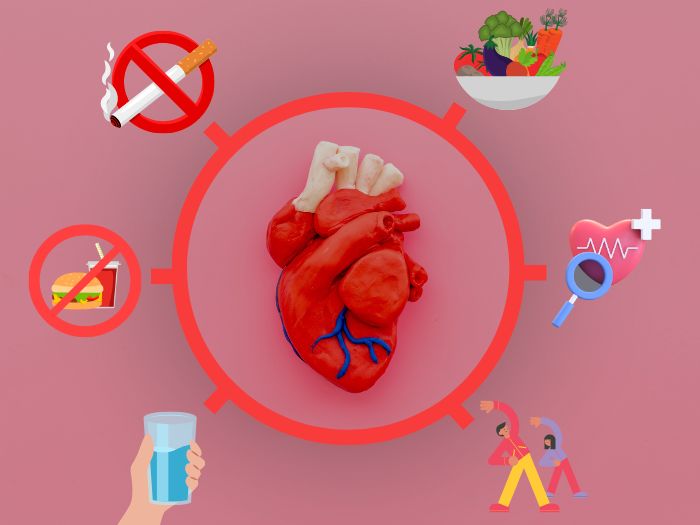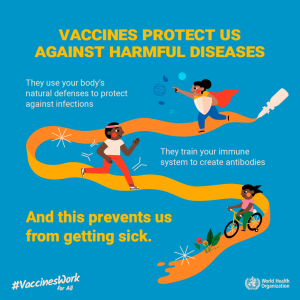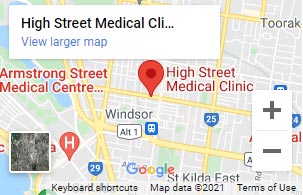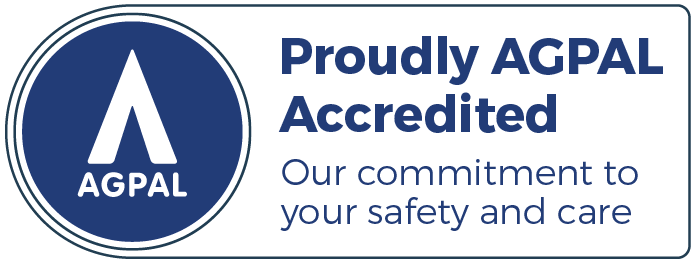Heart health is often a focus for anyone targeting good health and wellbeing, and that should be all of us.
Since February marks RedFeb, a month dedicated to raising awareness for heart health, we’re delving into essential aspects of this important topic.
In this article, we debunk common myths, address mistakes, and provide actionable tips to boost your cardiovascular wellness.
Heart health at HSMC
It’s no surprise that heart health impacts many branches of what we’re passionate about at HSMC; women’s health, men’s health and general medicine to name just a few.
As such, the whole HSMC community puts a strong emphasis on hearts, something that affects everyone, no matter their lifestyle, age, gender or other circumstances.
The basics of heart health
Heart health means the overall proper functioning of the heart and blood vessels. It’s crucial because a healthy heart supports proper circulation, delivers oxygen and nutrients to the body, and reduces the risk of cardiovascular diseases.
FYI: The term “blood vessel”covers both veins and arteries. Arteries carry blood away from your heart, veins carry blood back toward your heart.
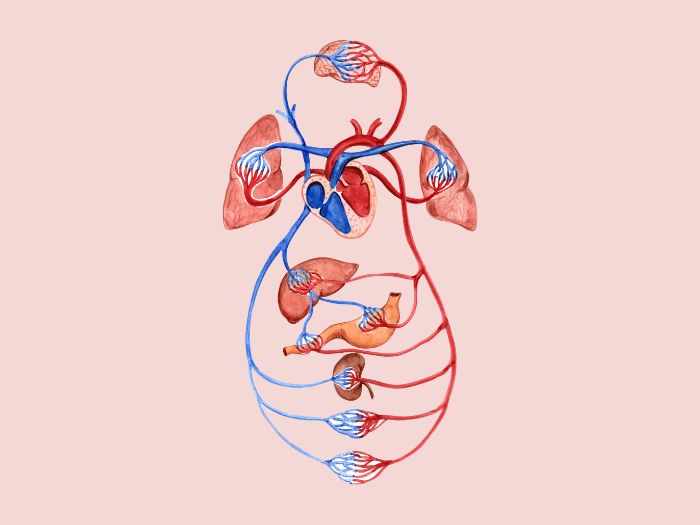
Some key factors that influence heart health
- Diet
- Physical Activity
- Tobacco Use: Smoking increases the risk of heart disease and stroke by damaging blood vessels, raising blood pressure, and contributing to the buildup of plaque in the arteries
- Alcohol Consumption: Can lead to high blood pressure, irregular heart rhythms, cardiomyopathy, and an increased risk of heart disease
- Stress Management
- High Blood Pressure: Strains the heart and blood vessels, increasing the risk of heart attack, stroke, and other cardiovascular complications
- Cholesterol Levels: Elevated levels of LDL cholesterol (“bad” cholesterol) and low levels of HDL cholesterol (“good” cholesterol) can lead to the buildup of plaque in the arteries, increasing the risk of heart disease and stroke
- Genetics and Family history
- Sleep: Poor quality or insufficient sleep can increase the risk of obesity and high blood pressure
Things like cholesterol levels, tobacco use, alcohol, and diet impact general health over time, often for worse as we age.
If it’s been a while since your last check-up, ensure your heart health is not taking a path toward something serious.
Common heart health myths busted
Myth: Only older adults need to worry about heart health.
Fact: Heart health is important for everyone, regardless of age, as heart disease can affect anyone. Risk factors such as poor diet, minimal or no exercise, smoking and excessive alcohol consumption, and high stress levels can impact heart health at any age and put hearts on a path towards problems.
Myth: Heart disease only affects overweight people and unhealthy people.
Fact: Heart disease can affect people of all shapes, sizes, and lifestyles, not just those who are overweight or unhealthy.
Thin and even fit-looking people can also develop heart disease due to factors such as genetics, high cholesterol and high blood pressure.
Myth: Supplements can prevent heart disease on their own.
Fact: While certain supplements may support heart health, they cannot prevent heart disease on their own.
Supplements are designed to compliment a healthy lifestyle, not replace it.
Myth: Heart disease is inevitable with age.
Fact: While the risk of heart disease increases with age, it is not an inevitable part of ageing.
Healthy lifestyle habits, managing risk factors, and regular medical care can significantly help prevent or delay the onset of heart disease.
This certainly underscores why medical professionals prioritise the importance of healthy choices.
Common heart health mistakes to avoid
Neglecting regular exercise
Exercise strengthens heart muscles, improves circulation and helps lower blood pressure and cholesterol levels, reducing the risk of heart disease and stroke.
Regular physical activity also helps reduce extra kilos and reduces stress, two key impacts on hearts.
Neglecting regular exercise can often mean replacing or blurring the lines between being busy and exercising. In other words, for most people being busy does not mean exercising.
Ensure proper exercise is part of your weekly routine.
Sacrificing a healthy diet
A healthy diet provides nutrients that support cardiovascular function and help maintain cholesterol and blood pressure levels. Eating a balanced diet can reduce the risk of heart disease by a large percentage.
Sacrificing a healthy diet means replacing healthy choices with unhealthy ones, something many of us are guilty of.
For example, you might:
- Choose chips or fried food for a snack at work
- Consume too much alcohol or drink too regularly (even if it’s just a small amount)
- Opt for cheaper low-quality meals more often, like instant noodles (hint: vegetables are often a very budget-friendly choice)
- Get tempted with food delivery services, eating out or poor choices in the supermarket
Ignoring or mismanaging stress
Stress can be detrimental to heart health because it can lead to increased blood pressure, inflammation, and unhealthy coping behaviours like overeating, drinking too much or smoking.
These things raise the risk of heart disease and stroke, often significantly.
Chronic stress contributes to the buildup of plaque in the arteries and can disrupt heart rhythm.
FYI: Plaque in the arteries is a buildup of fatty substances, cholesterol and other materials on the inner walls of the arteries. This plaque can harden and narrow the arteries, restricting blood flow and increasing the risk of heart disease and stroke.
Overlooking sleep quality
Waking up and wishing you could stay in bed, feeling sleepy during the day and generally being tired is something many of us deal with for years on end, sometimes decades.
However, poor sleep is detrimental to heart health because it can lead to higher blood pressure, increased inflammation, and irregular heart rhythms.
Takes steps to improve your sleep:
- Force an earlier bedtime
- Create a calmer sleeping environment
- Minimise disturbances from pets, kids (if you can), early morning sunlight, and other things
- Keep yourself calm in the lead up to bedtime
Boosting your heart health
There are some simple things you can do to boost your heart health that don’t have to cost a lot—a lot of money or time that is.
Keep an eye on condiments and processed foods
It’s one thing to make healthy choices; a sandwich from home instead of eating out, salads and dishes with a lot of veggies, but what about the sauces?
Sauces can contain large amounts of salt and sugar, so beware when you’re selecting what to eat.
Processed foods, which often include condiments as well as deli meats, instant noodles, sausage rolls, pies and desserts (it’s a long list), are harmful to heart health.
This is because processed food contains high levels of unhealthy fats, sodium, and added sugars which can lead to high cholesterol levels, high blood pressure, and increased risk of heart disease.
These foods tend to lack essential nutrients and fibre found in whole foods, further compromising cardiovascular wellness.
Maintaining a healthy weight
Maintaining a healthy weight is crucial for heart health because excess weight can strain your heart, leading to conditions like high blood pressure and cholesterol which increase the risk of heart disease.
Take a look at this body mass index calculator to see your BMI. Hopefully, it’s in the green.
Being overweight increases strain on your heart and is associated with a range of cardiovascular risks.
Routine check-ups
Regular check-ups are important because they can identify risk factors allowing for intervention and prevention of heart disease.
Screenings, which are recommended at various stages of life, can detect heart-related issues early on, enabling treatment and management of heart health.
Ignoring or missing regular check-ups can be detrimental because it delays the detection and management of potential heart issues, increasing the risk of serious complications or even heart disease progression.
Heart health in summary
Like many parts of health and wellbeing, heart health is something that can go unchecked resulting in problems developing, often without symptoms, until the serious stages.
Some people have an ‘if it’s not broken, don’t fix it’ attitude when it comes to health which can be dangerous, especially if their lifestyle choices aren’t the best.
If you haven’t had a check-up in a while, or aren’t too sure of your heart’s health, get in touch with us.
HSMC are proud advocates of heart health and encourage all our patients, new and existing, to maintain a healthy heart.

